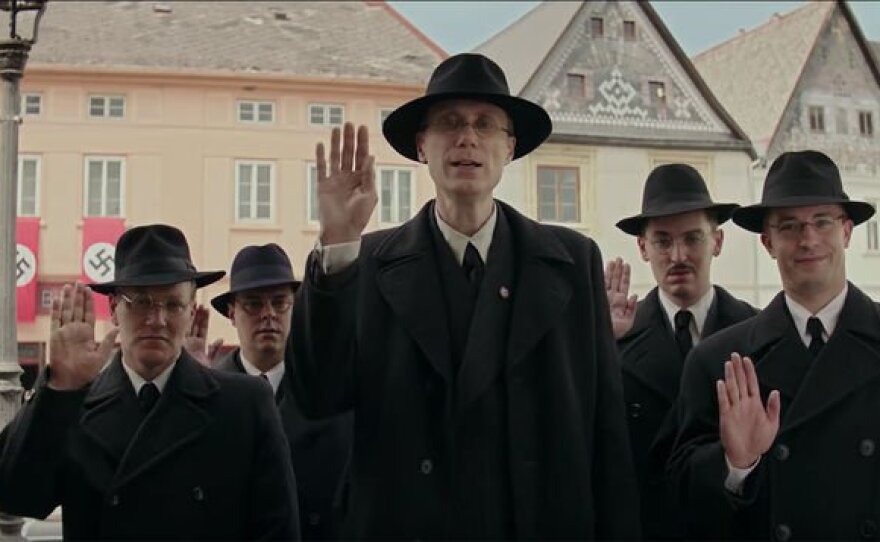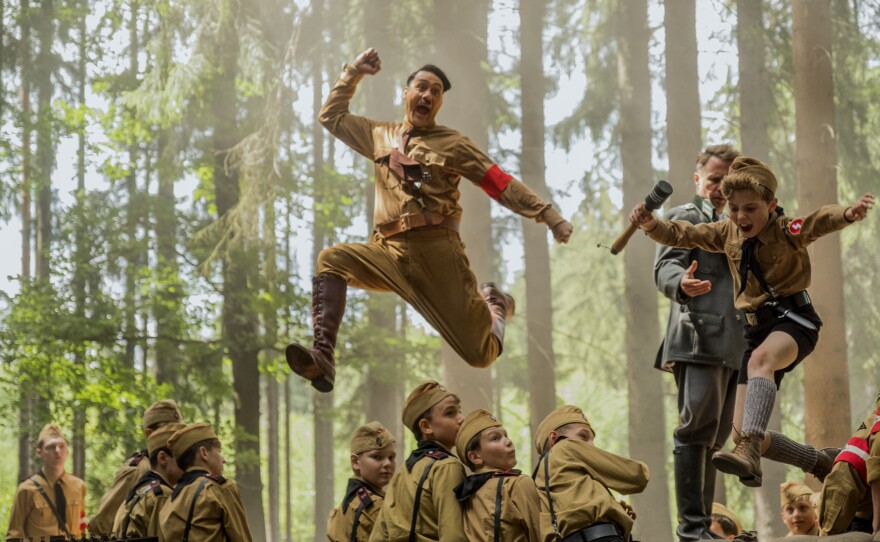Companion viewing
"The Great Dictator" (1940)
"To Be Or Not To Be" (1942)
"The Producers" (1967)
"The Interview" (2014)
"Death of Stalin" (2017)
Takia Waititi goes from the safety of the Marvel Cinematic Universe to the tricky and risky comic terrain of "Jojo Rabbit," which is being billed as an "anti-hate satire."
Listen to my interview with actor Stephen Merchant about "Jojo Rabbit" and playing a Nazi for laughs on Cinema Junkie Podcast 181.
Jojo (Roman Griffin Davis), a young boy in Nazi Germany, idolizes Adolf Hitler and aspires to be an ideal soldier in the Fuhrer's army. He keeps Hitler as an imaginary friend that he talks to constantly and confides in as he faces a series of challenges. His mother, Rosie, (Scarlett Johansson) seems less enthusiastic about Hitler and tries to get her son to think more for himself than toe the line of the Fuhrer's fanatical beliefs. Jojo's world is thrown into turmoil when his anti-Semitic views are challenged by the first real Jew (played by Thomasin McKenzie) he's ever met.
All this may not sound like the material of a comedy but in the hands of writer-director Takia Waititi it is. He walks a tricky line as he moves from slapstick to pathos and back again. At a time when many comedians are feeling the chill of political correctness to steer clear of potentially offensive humor, Waititi jumps into a story where a kid blowing himself up is played like a cartoon punchline.
Waititi adapted the script from Christine Leunens' novel "Caging Skies" and gave her story his unique comic spin.

Stephen Merchant plays a Nazi officer in the film. Merchant is also a writer and director in his own right having been one of the co-creators of the British show "The Office" and he shared his insights about why the film works so well.
"I was thinking, 'Wow! This is going to be a sort of audacious roll of the dice,'" Merchant recalled on first reading Waititi's script. "I think he starts with humor, sometimes quite broad sometimes even surreal in a Monty Python way, and then somewhere in the mid-point of the film you're starting to really invest in these people and by the end I think it's very emotional and very heartfelt, and that's that's a testament to him. I think it's some kind of sleight of hand that is very impressive and I think in part it's because Takia is just very instinctive. I think he just goes with his gut and I think he feels whereas perhaps I would have over-analyzed it. I think he's just gone with I'm going to make you laugh and I'm going to make you cry and I think he just goes with his instinct and I think he pulls it off magnificently."
Waititi doesn't overthink his comedy. This is not the cold, crystalline satire of Stanley Kubrick's "Dr. Strangelove." It is a comedy that comes at you from an emotional level and through the flawed humanity of the characters. Waititi has a gift for making us care about his characters from the bickering vampire roommates of "What We Do in the Shadows" to the superheroes of the Marvel Universe. He shows us Jojo's point of view and doesn't judge him but rather tries to show what contributes to a young boy willingly buying into Nazi propaganda and then how those ideas can be turned by real world experiences.
Merchant pointed out that finding humor in "big or difficult subjects" is nothing new.
"It puts me in mind of films like 'Dr. Strangelove,' there's no more bleak subject the nuclear apocalypse [or] Monty Python's 'Life of Brian' and in this case we're dealing with Hitler, we're dealing with prejudice and the way that sort of I suppose people can get swept up in a particular ideology, particularly children. And so in that regard it fits into an even longer tradition of movies that satirized and mocked Hitler right back to the 1940s when he was still in power, obviously Chaplin's 'The Great Dictator' being a prime example but also Lubitsch did it with "To Be Or Not To Be, later Mel Brooks in the '60s [with 'The Producers'] and certainly in the UK where I'm from there was a long tradition of people mocking Hitler."
Waititi's plays a version of Hitler filtered through a young boy's imagination so it begins as somewhat endearing and fatherly but as Jojo starts to question Hitler's dogma, Waititi's performance grows more petulant and juvenile and his tantrums may remind you of some more contemporary political leaders here and abroad.
The film also benefits from some truly spectacular and engaging performances by the young cast of Davis as well as McKenzie and the absolutely lovable Archie Yates as Jojo's friend. Waititi has a gift for casting the right person for every role and he coaches wonderfully nuanced comic performances from these young players.
"Jojo Rabbit" makes us laugh at some truly scary things and when the Allied troops roll into Germany, it's not the joyous event you might expect and that goes to the film's sly audacity to not give into a simple feel good ending. It wants to make you laugh but it also wants to make you think. And kudos to Waititi to making us do both in such an entertaining and bittersweet way.
Listen to my full interview with actor Stephen Merchant where he talks about "Jojo Rabbit" and how to play a Nazi for laughs on Cinema Junkie Podcast 181.







